TRANSLATIONS
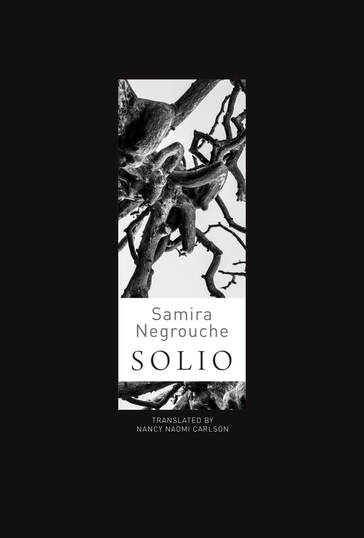
Solio
Samira Negrouche
Seagull Books, May 2024
Poetry that serves as an evocative portrayal of diverse landscapes and cultures.
In these otherworldly poetry sequences, Samira Negrouche reminds us that ‘all life is movement,’ where ‘time passes through me / beings pass through me / they are me / I am them.’ The ‘I’ is representative of one voice, three voices, all voices, all rooted in movement as their bodies brush past one another, brush against thresholds of time and space. Everything is in flux—including the dream-like landscapes at the borders of borders—as the poet seeks to recover parts of self and memory, on both a personal and universal level. In these poems, history-laden locales such as Algiers, Timbuktu, N’Djamena, Cotonou, Zanzibar, Cape Town and Gorée are evoked. Even the language, expertly and sensitively translated by Nancy Naomi Carlson, refuses to be pinned down, as it loops back on itself. At times contradictory, at times fractured in meaning, syntax and diction, the playful language is riddled with ‘restless’ verbs. In the end, the ‘I’ takes on prophetic overtones, instilling hope for the future.
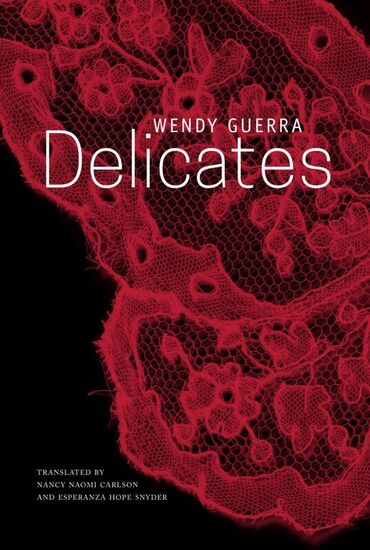
Delicates
Wendy Guerra
Seagull Books, April 2023
Poems from a critically acclaimed Cuban writer available in English for the first time.
Imbued with a sensuality reminiscent of the work of Anaïs Nin, Wendy Guerra’s Delicates takes readers on an exhilarating journey through the cities of love, where women leave their bodies “in the showers of men,” marking their territory “like animals in heat,” their panties “saturated with sand and a sidereal isolating odor.” Guerra’s shocking metaphors and images invite us to enter her gallery of striking and provoking poems where we witness a flight through the air from a thirty-fourth-story window and a woman’s pilgrimage to the salt flats “to taste the pink in stones” on her lover’s behalf. Guerra’s relationship with her native Cuba—much like her relationships with men—is complex and multilayered. Her work confronts the realities of a political system that doesn’t celebrate artistic freedom.
Here we have a new way of looking at a woman, an artist, a country, and the colonizers of that country. In these music-infused poems, Guerra shares with us her hard-won truths.
REVIEWS FOR DELICATES:
‘[A] restless and provocative interrogation of power.’—Rebecca Morgan Frank, Literary Hub
‘The range of emotions and tones in Delicates speak to the comprehensiveness of Guerra’s poetic approach: a compelling book of longing and loss.’—Nick Ripatrazone, The Millions
‘Delicates aligns with a lineage of women writers in Cuba who wrote about female sexuality and the body. Guerra revels in what many women are told to keep secret. She writes with unabashed reclamation of the body and of pleasure. [. . .] Although many forces seek to silence and erase her voice from literature, Guerra rises triumphant in this collection.’—Laura Villareal, Free State Review. Read the full review.
‘Haunting images drift up from every page of this collection in which Carlson and Snyder have captured the music of Guerra’s words and worlds — her delicates, if you will. This is a book that will not rest easily on the shelf; it does not deserve to gather dust. Instead, leave Delicates on your bedside table to pick up time and time again. Allow its words to caress you in your dreams.’—W. Luther Jett, Washington Independent Review of Books. Read the full review.
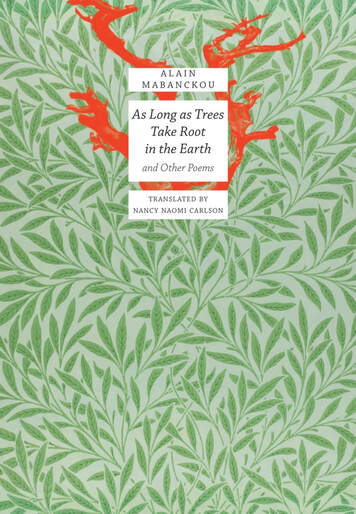
As Long as Trees Take Root
in the Earth and Other Poems
Alain Mabanckou
Seagull Books, October 2021
These compelling poems by novelist and essayist Alain Mabanckou conjure nostalgia for an African childhood where the fauna, flora, sounds, and smells evoke snapshots of a life forever gone. Mabanckou’s poetry is frank and forthright, urging his compatriots to no longer be held hostage by the civil wars and political upheavals that have ravaged their country and to embrace a new era of self-determination where the village roosters can sing again.
These music-infused texts, beautifully translated by Nancy Naomi Carlson and supported by a grant from the National Endowment for the Arts, appear together in English for the first time. In these pages, Mabanckou pays tribute to his beloved mother, as well as to the regenerative power of nature, and especially of trees, whose roots are a metaphor for the poet’s roots, anchored in the red earth of his birthplace.
Mabanckou’s yearning for the land of his ancestors is even more poignant because he has been declared persona non grata in his homeland, now called Congo-Brazzaville, due to his biting criticism of the country’s regime. Despite these barriers, his poetry exudes hope that nature’s resilience will lead humankind on the path to redemption and reconciliation.
REVIEWS FOR AS LONG AS TREES TAKE ROOT IN THE EARTH AND OTHER POEMS:
"Alain Mabanckou’s As Long as Trees Take Root in the Earth and Other Poems, translated from the French by Nancy Naomi Carlson, is the long-overdue English-language debut of one of the world’s most prominent Francophone poets. . .Nancy Naomi Carlson’s sensitive and painstaking translations of this powerful, important writer are a boon to anyone interested in the world of Francophone letters." (Los Angeles Review)
"...the sometimes brilliant, sometimes necessarily restrained choices the translator has made." (Kurt Heinzelman, World Literature Today)
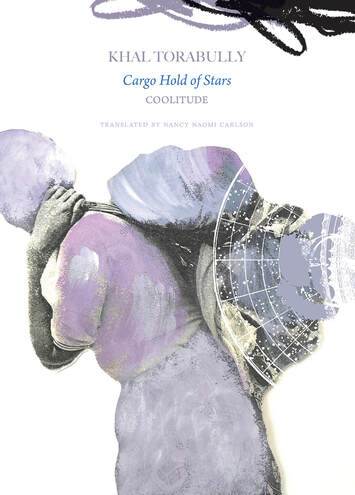
Cargo Hold of Stars
Coolitude
Khal Torabully
*WINNER OF THE OXFORD-WEIDENFELD TRANSLATION PRIZE
*FINALIST, SARAH MAGUIRE POETRY TRANSLATION PRIZE
Seagull Books, February 2021
Cargo Hold of Stars is an ode to the forgotten voyage of a forgotten people. Khal Torabully gives voice to the millions of indentured men and women, mostly from India and China, who were brought to Mauritius between 1849 and 1923. Many were transported overseas to other European colonies. Kept in close quarters in the ship’s cargo hold, many died. Most never returned home.
With Cargo Hold of Stars, Torabully introduces the concept of ‘Coolitude’ in a way that echoes Aimé Césaire’s term ‘Negritude,’ imbuing the term with dignity and pride, as well as a strong and resilient cultural identity and language. Stating that ordinary language was not equipped to bring to life the diverse voices of indenture, Torabully has developed a ‘poetics of Coolitude’: a new French, peppered with Mauritian Creole, wordplay, and neologisms—and always musical. The humor in these linguistic acrobatics serves to underscore the violence in which his poems are steeped.
Deftly translated from the French by Nancy Naomi Carlson, Cargo Hold of Stars is the song of an uprooting, of the destruction and the reconstruction of the indentured laborer’s identity. But it also celebrates setting down roots, as it conjures an ideal homeland of fraternity and reconciliation in which bodies, memories, stories, and languages mingle—a compelling odyssey that ultimately defines the essence of humankind.
REVIEWS FOR CARGO HOLD OF STARS: COOLITUDE:
"Nearly three decades later, Torabully’s epic has been translated in English for the first time by Nancy Naomi Carlson." (The Nation)
"The masterful English translation is by Nancy Naomi Carlson, a celebrated poet in her own right...Khal Torabully’s visual, musical, and linguistic virtuosity comes through in Nancy Naomi Carlson’s wonderful translation." (Los Angeles Review of Books)
***Listed in Prairie Schooner's Poetry and Media as a “February release well worth checking out.” [February 27, 2021]
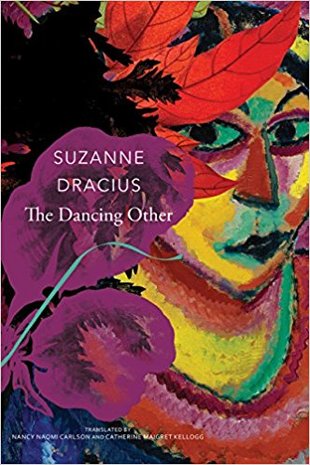
The Dancing Other
Suzanne Dracius
Seagull Books, November 2018
The Dancing Other takes readers to France and Martinique to reveal the struggles of people who belong both places, but never quite feel at home in either. Suzanne Dracius tells the story of Rehvana, a woman who feels she is too black to fit in when living in mainland France, yet at the same time not dark-skinned enough to feel truly accepted in the Caribbean. Her sense of dislocation manifests itself at first in a turn to a mythical idea of Mother Africa; later, she moves to Martinique with a new boyfriend and thinks she may have finally found her place—but instead she is soon pregnant, isolated, and lonely. Soon her only reliable companion is her neighbor, Ma Cidalise, who regales her in Creole with supernatural tales of wizards. Rehvana, meanwhile, watches her dream of belonging fade, as she continues to refuse to accept her multicultural heritage.
REVIEWS FOR THE DANCING OTHER:
Drunken Boat introduced an excerpt of this novel by commenting that "translators Nancy Naomi Carlson and Catherine Maigret Kellogg perform a high-wire act with Dracius's relentless word play and juggling of Creole, Latin, and French slang...a jaw-dropping accomplishment."
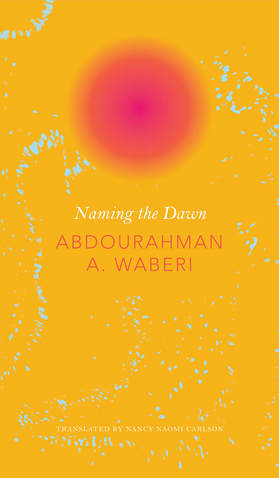
Naming the Dawn
Abdourahman A. Waberi
Seagull Books - The Africa List (Distributed in the USA by the University of Chicago Press). May 2018
The poems in this new volume by Abdourahman A. Waberi are introspective and inquisitive, reflecting a deep spiritual bond—with words, with the history of Islam and its great poets, with the landscapes those poets walked, among which Waberi grew up. The sage yearns here for the simplicity of each individual moment to somehow become eternal, for the histories and people that are part of him—his mother, his wife, his unborn child, the sacred texts that ground his being—to come together harmoniously within him, and to emerge through his words. Lyrical and personal, but with powerful historical and cultural resonances, these poems are the work of a master at the height of his powers.
REVIEWS FOR THE FRENCH EDITION OF NAMING THE DAWN
“With Naming the Dawn, Abdourahman A. Waberi delivers a magnificent poetic art, where the deciphering of the poem—the patient rhythm of reading, listening to signs—is a discovery of self and sacred texts, and ultimately, of the religious spirit . . . Mingling indiscriminately poetic writing and reading of the sacred texts—of the Quran—the author proposes here a formidable plea in favor of tolerance and openness.”
--Elera Bertho, Diacritik
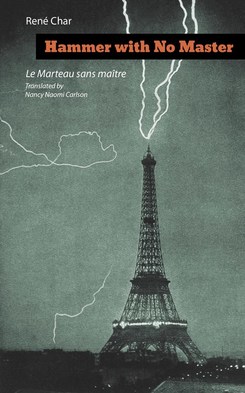
Hammer with No Master
René Char
*2017 FINALIST, FIRECRACKER AWARDS FOR POETRY BY THE COMMUNITY OF LITERARY MAGAZINES AND PRESSES (CLMP)
Tupelo Press, November 2016
In his foreword to Stone Lyre, Nancy Naomi Carlson’s previous collection of René Char translations, Ilya Kaminsky praised “the intensity, the dream-like language, the gravity of tone, and the constant impression that one is reading not words in the language, but sparks of flames.”
Stone Lyre was a selection of poems from Char’s numerous volumes of poems; Carlson’s new Hammer with No Master is a discrete and continuous work, the first English translation of Char’s Le marteau sans maître, first published in 1934 — a time of rumbling menace that our time resembles.
REVIEWS FOR HAMMER WITH NO MASTER:
“René Char died at 81 in 1988, which means he fills the heart of the history of twentieth-century French poetry. More than that he is among those figures who represent the consequences of Modernism. Finally more symbolist than surrealist he broke away from André Breton’s movement right before the war in which he served in the Résistance. All of that experience and the long post-war focus his fierce and severe imagination. Nancy Naomi Carlson’s new translation of an important selection from Char’s career is both accurate and alive to Char’s lyric vitality and wonderfully strange prose-poetry.”
—Stanley Plumly
René Char
*2017 FINALIST, FIRECRACKER AWARDS FOR POETRY BY THE COMMUNITY OF LITERARY MAGAZINES AND PRESSES (CLMP)
Tupelo Press, November 2016
In his foreword to Stone Lyre, Nancy Naomi Carlson’s previous collection of René Char translations, Ilya Kaminsky praised “the intensity, the dream-like language, the gravity of tone, and the constant impression that one is reading not words in the language, but sparks of flames.”
Stone Lyre was a selection of poems from Char’s numerous volumes of poems; Carlson’s new Hammer with No Master is a discrete and continuous work, the first English translation of Char’s Le marteau sans maître, first published in 1934 — a time of rumbling menace that our time resembles.
REVIEWS FOR HAMMER WITH NO MASTER:
“René Char died at 81 in 1988, which means he fills the heart of the history of twentieth-century French poetry. More than that he is among those figures who represent the consequences of Modernism. Finally more symbolist than surrealist he broke away from André Breton’s movement right before the war in which he served in the Résistance. All of that experience and the long post-war focus his fierce and severe imagination. Nancy Naomi Carlson’s new translation of an important selection from Char’s career is both accurate and alive to Char’s lyric vitality and wonderfully strange prose-poetry.”
—Stanley Plumly
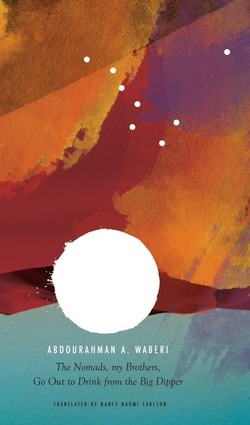
The Nomads, My Brothers, Go Out to Drink from the Big Dipper
Abdourahman A. Waberi
*2016 FINALIST, BEST TRANSLATED BOOK AWARD (BTBA) IN POETRY
*SELECTED AS ONE OF "BEST BOOKS OF 2015" BY BELTWAY POETRY QUARTERLY
Seagull Books - The Africa List (Distributed in the USA by the University of Chicago Press). May 2015
Few of us have had the opportunity to visit Djibouti, the small crook of a country strategically located in the Horn of Africa, which makes The Nomads, My Brothers, Go Out to Drink from the Big Dipper all the more seductive. In his first collection of poetry, the critically acclaimed writer Abdourahman A. Waberi writes passionately about his country’s landscape, drawing for us pictures of “desert furrows of fire” and a “yellow chameleon sky.” Waberi’s poems take us to unexpected spaces—in exile, in the muezzin’s call, and where morning dew is “sucked up by the eye of the sun—black often, pink from time to time.”
Translated by Nancy Naomi Carlson, Waberi’s voice is intelligent, at times ironic, and always appealing. His poems strongly condemn the civil wars that have plagued East Africa and advocate tolerance and peace. In this compact volume, such ideas live side by side as a rosary for the treasures of Timbuktu, destroyed by Islamic extremists, and a poem dedicated to Edmond Jabès, the Jewish writer and poet born in Cairo.
REVIEWS FOR THE NOMADS, MY BROTHERS, GO OUT TO DRINK FROM THE BIG DIPPER:
"W.S. Merwin said translation is impossible yet we do it. Carlson is a seasoned translator who has, with her gift of languages, translated René Char among others, and now premieres an African poet. From Waberi’s eyes we see his country of Djibouti in the Horn of Africa. His is a graceful presence allowing us into his consciousness via geography — his universe, his desert. (“There”) I live several leagues/from memory’s inland port/old silent structure/by claws of weather and time.” His poems in the section “Postcards” are not longer than those lines. The wars of East Africa are in the background; but in this poet’s commitment to poetry does not fully explore the obvious. It’s found within the expressionistic imagery of the natural world — such gentle perception — such careful depictions and messages — yet Waberi makes his points about the deepest questions of what is beautiful and what is violated."
—Grace Cavalieri, Washington Independent Review of Books
“With Waberi, the juxtapositions—surprising, provocative, and original—form a good part of the thrill themselves.”
—Words Without Borders
Abdourahman A. Waberi
*2016 FINALIST, BEST TRANSLATED BOOK AWARD (BTBA) IN POETRY
*SELECTED AS ONE OF "BEST BOOKS OF 2015" BY BELTWAY POETRY QUARTERLY
Seagull Books - The Africa List (Distributed in the USA by the University of Chicago Press). May 2015
Few of us have had the opportunity to visit Djibouti, the small crook of a country strategically located in the Horn of Africa, which makes The Nomads, My Brothers, Go Out to Drink from the Big Dipper all the more seductive. In his first collection of poetry, the critically acclaimed writer Abdourahman A. Waberi writes passionately about his country’s landscape, drawing for us pictures of “desert furrows of fire” and a “yellow chameleon sky.” Waberi’s poems take us to unexpected spaces—in exile, in the muezzin’s call, and where morning dew is “sucked up by the eye of the sun—black often, pink from time to time.”
Translated by Nancy Naomi Carlson, Waberi’s voice is intelligent, at times ironic, and always appealing. His poems strongly condemn the civil wars that have plagued East Africa and advocate tolerance and peace. In this compact volume, such ideas live side by side as a rosary for the treasures of Timbuktu, destroyed by Islamic extremists, and a poem dedicated to Edmond Jabès, the Jewish writer and poet born in Cairo.
REVIEWS FOR THE NOMADS, MY BROTHERS, GO OUT TO DRINK FROM THE BIG DIPPER:
"W.S. Merwin said translation is impossible yet we do it. Carlson is a seasoned translator who has, with her gift of languages, translated René Char among others, and now premieres an African poet. From Waberi’s eyes we see his country of Djibouti in the Horn of Africa. His is a graceful presence allowing us into his consciousness via geography — his universe, his desert. (“There”) I live several leagues/from memory’s inland port/old silent structure/by claws of weather and time.” His poems in the section “Postcards” are not longer than those lines. The wars of East Africa are in the background; but in this poet’s commitment to poetry does not fully explore the obvious. It’s found within the expressionistic imagery of the natural world — such gentle perception — such careful depictions and messages — yet Waberi makes his points about the deepest questions of what is beautiful and what is violated."
—Grace Cavalieri, Washington Independent Review of Books
“With Waberi, the juxtapositions—surprising, provocative, and original—form a good part of the thrill themselves.”
—Words Without Borders
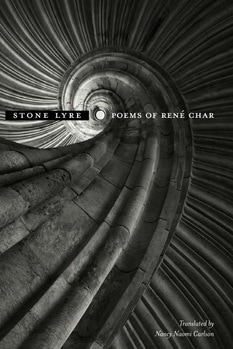
Stone Lyre: Poems of René Char
Tupelo Press, February 2010
"This new translation of Char’s work …shows us …the intensity, the dream-like language, the gravity of tone, and the constant impression that one is reading not words in the language, but sparks of flames…"
“Carlson brings her ear to Char’s work in English in a compelling way. Anyone who opens this book…will love her musical use of our language.”
From the Foreword to Stone Lyre, by Ilya Kaminsky, poet and author of Dancing in Odessa
REVIEWS FOR STONE LYRE:
"René Char is the conscience of modern French poetry and also its calm of mind. Nancy Naomi Carlson, in these splendid translations, casts new light upon the sublime consequence of Char’s poetic character, and in Stone Lyre the case for sublimity is purely made."
—Donald Revell, poet and translator of Rimbaud and Apollinaire
"Early Surrealist, resistance fighter, anti-nuclear activist, and exquisite poet, René Char is at the heart of 20th century French poetry…. Carlson gives English-language readers a real sense of Char’s depth and breadth. And her masterful translations catch the barely contained drama that gives Char’s work such tension and presence…"
“[Carlson’s] excellent ear picks up not only the sound relationships that weave through the originals, but also their delicate, seductive rhythms. A beautiful accomplishment.”
--Cole Swensen, poet, translator, and founding editor of La Presse
"René Char, intrepid explorer of the marvelous, witness to the catastrophe of history, plowman of 'the metered field,’ stands revealed in Nancy Naomi Carlson’s splendid translations as a guiding spirit of our time…"
--Christopher Merrill, poet, journalist, and director of the University of Iowa’s International Writing Program
"In a new translation from Nancy Naomi Carlson, the enchanting voice of the visionary René Char is once again brought to life. Stone Lyre, a collection of selected poems from across nearly fifty years of Char’s career, charms the reader with its mysterious and unfettered imagery. But the poet’s particular blend of the personal and the cosmic spheres should not be considered an easy read. Carlson, in her introduction, remarks on the difficulty of Char’s “lyric intensity,” but the results of her translations amount to a compelling success."
—Adam Palumbo, The Rumpus
"Carlson’s translations flow easily, rhythmically, and are a pleasure to read. They are a reflection of Char’s energy and complexity and the literary register is just."
—William La Ganza, Cerise Press
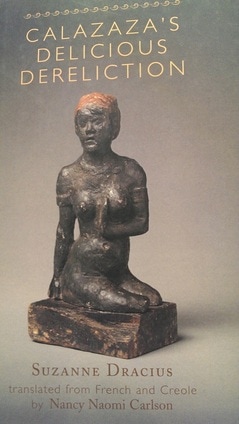
Calazaza's Delicious Dereliction
Suzanne Dracius
Tupelo Press, November 2015
In her polyphonic poems, Suzanne Dracius creates protagonists—usually calazazas, light-skinned mulatto women with red or blond hair—who fight like Amazons against racial and gender discrimination. Dracius’s voice is leaping and exalted, often sexually charged, and infused with allusions to Greek and Roman mythology.
Nancy Naomi Carlson has translated Dracius’s Exquise déréliction métisse, poems written in French yet including some Creole versions, and with Creole expressions sprinkled throughout. In French, this book was awarded the prestigious Prix Fètkann, whose judges cited the poet’s richness of language, with varied linguistic registers.
REVIEWS FOR CALAZAZA'S DELICIOUS DERELICTION:
“Nancy Naomi Carlson [has] transported these verses into English with verve and piquancy, aural skill and consummate knowledge.”
—Orlando Ricardo Menes
“Nancy Naomi Carlson… beautifully renders the dense word and sonic play Dracius trades in.”
—Sidney Wade
Suzanne Dracius
Tupelo Press, November 2015
In her polyphonic poems, Suzanne Dracius creates protagonists—usually calazazas, light-skinned mulatto women with red or blond hair—who fight like Amazons against racial and gender discrimination. Dracius’s voice is leaping and exalted, often sexually charged, and infused with allusions to Greek and Roman mythology.
Nancy Naomi Carlson has translated Dracius’s Exquise déréliction métisse, poems written in French yet including some Creole versions, and with Creole expressions sprinkled throughout. In French, this book was awarded the prestigious Prix Fètkann, whose judges cited the poet’s richness of language, with varied linguistic registers.
REVIEWS FOR CALAZAZA'S DELICIOUS DERELICTION:
“Nancy Naomi Carlson [has] transported these verses into English with verve and piquancy, aural skill and consummate knowledge.”
—Orlando Ricardo Menes
“Nancy Naomi Carlson… beautifully renders the dense word and sonic play Dracius trades in.”
—Sidney Wade
